The Carolina Covenant Has Been Successful in Increasing Retention and Graduation Rates for Low-Income Students
 In 2003 the University of North Carolina at Chapel Hill introduced the Carolina Covenant program in which low-income students would have all their financial aid needs met by grants. Students work 10 to 12 hours a week at a college job but are able to graduate debt-free. In 2003 the University of North Carolina at Chapel Hill introduced the Carolina Covenant program in which low-income students would have all their financial aid needs met by grants. Students work 10 to 12 hours a week at a college job but are able to graduate debt-free.
A new study by the university finds that students who have benefited from the Carolina Covenant have shown significant improvement in their graduation rates. The study found that students who enrolled in 2005 and received Carolina Covenant grants had a graduation rate that was 9.6 percentage points higher than students who enrolled in 2003, before the program was initiated, but who would have qualified for the program had it existed at that time.
This past fall, 558 new students received Carolina Covenant funds. They constituted more than 11 percent of the incoming class. Currently, there are 2,200 undergraduate students on campus who are part of the program.

UNIVERSITY OF NEW MEXICO
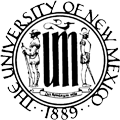
Dean of Instruction
The University of New Mexico (UNM) is seeking an experienced leader for the position of Dean of Instruction of the UNM Gallup Campus (http://www.gallup.unm.edu). UNM-Gallup is one of four branch community colleges of the University of New Mexico and serves approximately 3,000 students. The Dean of Instruction is the college’s chief academic officer who reports directly to the Executive Director and has overall responsibility for leadership and administration of the instructional program.
This is a tenured position with the successful candidate holding the qualifications to be appointed at the rank of professor in one of the academic disciplines at UNM-Gallup. Salary is dependent upon experience with a range in the upper $90’s to low $100’s.
The University New Mexico actively seeks and encourages nominations of and applications from individuals who are members of under-represented groups. A complete application includes (1) a 3 – 5 page cover letter that succinctly addresses the minimum and preferred qualifications for the position, (2) a curriculum vitae, (3) a 1 page statement of Leadership Philosophy attached to the “Other” Line, and (4) a list of five (5) professional references from colleagues and supervisors. For best consideration, apply by March 23, 2011. The position will remain open until filled. If you wish to nominate an individual, please contact Teresa Wilkins, Committee Chair at twilkins@unm.edu.
For further information and to apply, please go to https://unmjobs.unm.edu, Posting # 0809732.
The University of New Mexico is an Equal Opportunity/Affirmative Action Employer and Educator.
Apply Here: http://www.Click2Apply.net/mcmxv9x

Meharry Medical College Looks to Boost Enrollments
The Association of American Medical Colleges estimates that there will be a shortage of 45,000 primary care physicians in the United States by the year 2020. The shortage will be particularly severe in low-income minority communities where few doctors choose to serve.
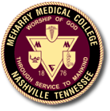 Meharry Medical College, the historically black educational institution in Nashville, has announced plans to increase its enrollment by 40 percent over the next decade in an effort to help reduce the shortage of primary care doctors serving low-income communities. Currently, Meharry enrolls 105 first-year medical students. It hopes to increase the number of new entrants to as many as 150 over the next 10 years. Meharry Medical College, the historically black educational institution in Nashville, has announced plans to increase its enrollment by 40 percent over the next decade in an effort to help reduce the shortage of primary care doctors serving low-income communities. Currently, Meharry enrolls 105 first-year medical students. It hopes to increase the number of new entrants to as many as 150 over the next 10 years.
There is no shortage of students seeking a Meharry education. This year it received 5,000 applications for its 105 available positions in its entering class. But increasing enrollments necessitate the hiring of more faculty and upgrades to classrooms, laboratories, and other facilities. In short, Meharry needs to raise a great deal of money from either governmental or private sources to achieve its goal of increasing enrollments.
Cornell University Was an Early Leader in Training Black Veterinarians
 Jennifer K. Morrissey, who worked as a research assistant to Donald F. Smith, dean emeritus of the Cornell University College of Veterinary Medicine, has completed an investigation determining the early black graduates of the college. She found that between 1910 and 1920, seven African Americans earned a doctorate in veterinary medicine from Cornell. Jennifer K. Morrissey, who worked as a research assistant to Donald F. Smith, dean emeritus of the Cornell University College of Veterinary Medicine, has completed an investigation determining the early black graduates of the college. She found that between 1910 and 1920, seven African Americans earned a doctorate in veterinary medicine from Cornell.
Kirksey Curd, a black man from Kentucky, was the first African-American graduate of the school. Curd later became a physician. Two of the early black graduates were brothers, Ray Potter Waller and Owen Waller Jr. Both opened private practices in New York City.
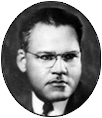 Undoubtedly the most famous black graduate of the college is Frederick Douglass Patterson, who earned his DVM at Cornell in 1932. He went on to become president of what is now Tuskegee University, where he started the Tuskegee College of Veterinary Medicine in 1944. At the time, there were only five black veterinarians in the southern states. It is estimated that today 70 percent of all African-American veterinarians received their training at Tuskegee. Undoubtedly the most famous black graduate of the college is Frederick Douglass Patterson, who earned his DVM at Cornell in 1932. He went on to become president of what is now Tuskegee University, where he started the Tuskegee College of Veterinary Medicine in 1944. At the time, there were only five black veterinarians in the southern states. It is estimated that today 70 percent of all African-American veterinarians received their training at Tuskegee.
University of Cincinnati Looks to Increase Racial Diversity of Students and Faculty
 A new report prepared for the president of the University of Cincinnati calls for a more concerted effort to enroll more black students, increase retention and graduation rates of minority students, and to hire more faculty of color. A new report prepared for the president of the University of Cincinnati calls for a more concerted effort to enroll more black students, increase retention and graduation rates of minority students, and to hire more faculty of color.
At the present time, blacks make up 9.6 percent of the 41,000 undergraduates at the university, a level that has remained stagnant in recent years. The black student graduation rate is 40 percent, 15 percentage points below the rate for the student body as a whole. There are 80 black faculty members at the university, an increase of only two from 10 years ago. Blacks are 3.9 percent of the total full-time faculty.
The new report calls for an increase in scholarship aid and a larger budget for recruiting black and other minority faculty.
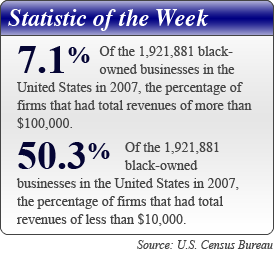

CORNELL UNIVERSITY

Associate Dean for Inclusion & Professional
Development in the Graduate School
The Associate Dean is a core member of the Graduate School (http://www.gradschool.cornell.edu/) leadership team, and provides vision, direction, and coordination for Graduate School initiatives to enhance the academic and professional development of graduate and professional students with a primary focus on students from groups historically underrepresented in graduate education. The Associate Dean will be responsible for strategic leadership in defining and implementing programs that foster competencies and develop skills to enhance students' academic success, improve retention and completion rates, and prepare students to pursue academic and non-academic careers following attainment of their degrees.
Qualifications: Advanced degree, preferably a Ph.D., and at least five years of experience in student services, career and professional development, graduate education, or a related field. Initiative, strong leadership skills, and the ability to build and maintain relationships are a must, as is demonstrated ability to identify, design, and implement cross-population and targeted retention and development programs to a diverse group of students. Must demonstrate an understanding of the dynamics of difference, privilege, and power, and have ability to foster constructive dialogue with different groups across campus, build trust, establish ongoing communication structures, and work in collaboration to ensure access and academic success and achievement for students from various backgrounds.
Review of materials will begin immediately and continue until position is filled. Applications will be kept strictly confidential.
To Apply: Submit a resume/CV, letter of application, and a list of 3 references. Include a statement describing your experiences and your vision for how you would develop and foster programs to address the responsibilities described above. Materials may be submitted online at http://hr.cornell.edu/jobs/ (Req. #14509). For additional information and to obtain the complete job description, contact Kelly Tillotson at (607) 255-5864 or klt8@cornell.edu. AA/EOE.

The Rarity of Black Professors at Predominantly White Universities
A new survey published on YourBlackWorld.com finds that 42 percent of all African-American students who attended a predominantly white university never had one black professor. The survey found that 75 percent of African-American students at predominantly white universities never had a black professor outside the field of black studies.
In Memoriam
Emmett W. Bashful (1917-2011)
 Emmett W. Bashful, the first chancellor of Southern University at New Orleans, died last month at a hospice facility in Baton Rouge. He was 93 years old. Emmett W. Bashful, the first chancellor of Southern University at New Orleans, died last month at a hospice facility in Baton Rouge. He was 93 years old.
Dr. Bashful was raised in Baton Rouge and graduated from Southern University in 1940. He taught in the public schools and served in the U.S. Army during World War II. After the war he earned a master’s degree and a Ph.D. in political science at the University of Illinois. After teaching at Florida A&M University and Southern University in Baton Rouge, in 1959 he was offered the opportunity to head the new Southern University campus in New Orleans. He remained chancellor there for 28 years.
Appointments, Promotions, and Resignations
 • Carlo D. Laurore was appointed director of gift planning at North Carolina A&T State University in Greensboro. He was vice president of business services at Branch Banking & Trust in Wilmington, North Carolina. • Carlo D. Laurore was appointed director of gift planning at North Carolina A&T State University in Greensboro. He was vice president of business services at Branch Banking & Trust in Wilmington, North Carolina.
Laurore is a graduate of the University of North Carolina at Wilmington and holds a graduate degree from Louisiana State University.
 • Regina V.K. Williams was named interim vice president for finance and administration at Norfolk State University in Virginia. Williams is the former city manager of Norfolk. • Regina V.K. Williams was named interim vice president for finance and administration at Norfolk State University in Virginia. Williams is the former city manager of Norfolk.
Williams is a graduate of Eastern Michigan University and holds a master’s degree in public administration from Virginia Commonwealth University.
 • Trae T. Cotton was appointed vice chancellor for student affairs at Winston-Salem State University in North Carolina. He was associate vice president and dean of students at Radford University in Virginia. • Trae T. Cotton was appointed vice chancellor for student affairs at Winston-Salem State University in North Carolina. He was associate vice president and dean of students at Radford University in Virginia.
Dr. Cotton is a graduate of the University of North Texas. He holds a master’s degree from Eastern New Mexico University and an educational doctorate from Walden University.
 • Marcus Fogle was named manager of the annual fund in the Division of Institutional Advancement at Claflin University in Orangeburg, South Carolina. Fogle is a 2009 graduate of the university and is currently studying for an MBA at the Claflin School of Business. • Marcus Fogle was named manager of the annual fund in the Division of Institutional Advancement at Claflin University in Orangeburg, South Carolina. Fogle is a 2009 graduate of the university and is currently studying for an MBA at the Claflin School of Business.
 • John McKnight was promoted to associate dean of students and director of multicultural development at Lafayette College in Easton, Pennsylvania. He was associate dean of the college. • John McKnight was promoted to associate dean of students and director of multicultural development at Lafayette College in Easton, Pennsylvania. He was associate dean of the college.
McKnight is a graduate of the University of Florida. He holds a master’s degree from Indiana University and is currently completing an educational doctorate at Indiana University of Pennsylvania.
 • Grant D. Venerable II has retired from his position as provost and senior vice president for academic and student affairs at Lincoln University in Pennsylvania. • Grant D. Venerable II has retired from his position as provost and senior vice president for academic and student affairs at Lincoln University in Pennsylvania.
Dr. Venerable earned a bachelor’s degree in chemistry from the University of California at Los Angeles. He earned a master’s degree and a Ph.D. in chemical physics from the University of Chicago. He is the author of six books and is an accomplished musician and painter.
Grants and Gifts
• Emory University in Atlanta received a $533,000 grant from the Andrew W. Mellon Foundation to continue funding the university’s visiting scholars program at the James Weldon Johnson Institute until 2014.
• Historically black North Carolina A&T State University received grants totaling nearly $1.5 million from the Federal Highway Administration and the North Carolina Department of Transportation. The grant will fund education programs to train students in right-of-way negotiations and acquisitions.
 • Myron Beasley, assistant professor of African-American studies and American cultural studies at Bates College, received a grant from the Warhol Foundation that he will use to fund the completion of his book, which is tentatively titled, Reciting Sites: Rituals, Death and Loss. • Myron Beasley, assistant professor of African-American studies and American cultural studies at Bates College, received a grant from the Warhol Foundation that he will use to fund the completion of his book, which is tentatively titled, Reciting Sites: Rituals, Death and Loss.
• The U.S. Department of Defense announced the awarding of 52 grants totaling $45.7 million under its Historically Black Colleges and Universities and Minority Institutions Program. The grants will fund programs in science disciplines that are applicable to national security.
 • Brenda Dixon Gottschild, founder of the Philadelphia School of Dance Arts, received a $50,000 grant from the Pew Center for Arts and Heritage to complete work on her book, Joan Myers Brown and the Audacious Hope of the Black Ballerina: A Biohistory of Performance and Race. • Brenda Dixon Gottschild, founder of the Philadelphia School of Dance Arts, received a $50,000 grant from the Pew Center for Arts and Heritage to complete work on her book, Joan Myers Brown and the Audacious Hope of the Black Ballerina: A Biohistory of Performance and Race.
|
End of the Road for Southern University of New Orleans?
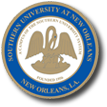 The Louisiana Board of Regents approved by a vote of 9-6 a proposal to merge historically black Southern University of New Orleans with the predominantly white University of New Orleans. Under the plan, the new institution would be called the University of Greater New Orleans. The Louisiana legislature must approve the merger. The Louisiana Board of Regents approved by a vote of 9-6 a proposal to merge historically black Southern University of New Orleans with the predominantly white University of New Orleans. Under the plan, the new institution would be called the University of Greater New Orleans. The Louisiana legislature must approve the merger.
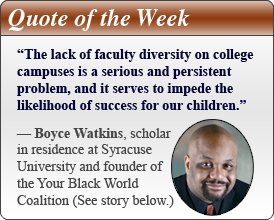
All Seniors at a Public Charter High School for Black Men in Chicago Are College Bound
There are 104 seniors at Urban Prep Academy for Young Men in Chicago. All of them have been accepted to college.
Urban Prep is a public charter high school reserved for African-American men. This is the second year in a row that all graduating seniors have been accepted into college. Students at the school are immersed in a challenging college preparatory curriculum and must abide by strict rules and a code of conduct.
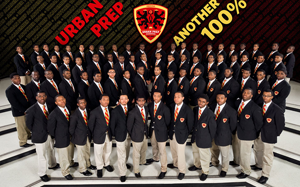
The Highs and Lows: Black Scoring Performance on Selected Advanced Placement Tests
Last week JBHE reported on the dismal performance of black students on Advanced Placement examinations. The mean score for black members of the high school class of 2010 was 1.88 on a scale of 1 to 5, with five being the highest score, equivalent to a grade of A.
But there are some AP tests where black students performed much better than the national average. For example, blacks scored 3.14 on the Italian test. But very few blacks nationwide took the test.
On widely taken AP tests, blacks did the best on the physics test of electricity and magnetism, computer science, and one of the two calculus tests.
In contrast, blacks scored poorly on the AP tests for biology, environmental science, statistics, and world history.

UNIVERSITY OF CONNECTICUT
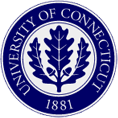
Director of University of Connecticut Stamford Campus
The University of Connecticut seeks applications for the position for Director of the Stamford Campus. Stamford, one of five regional campuses in the UConn system, extends the University’s land grant mission with world-class faculty and dedicated staff; excellence in teaching and research; and important mission of outreach and engagement with the urban, business and international community in southern Connecticut and within the state.
Minimum qualifications include: A doctorate with a track record of scholarship, teaching and community engagement; five years of leadership and management experience in a professional setting; strong interpersonal skills; and a demonstrated ability to develop and maintain constructive and professional relationships with a wide variety of individuals. Experience in building effective collaborative teams and a commitment to enhance the quality and diversity of the campus population are required. Outstanding applicants will have excellent leadership and communication skills with the ability to engage students, faculty, staff, alumni, campus supporters, and the people of the community served by UConn Stamford. The applicant should have the ability to identify key issues in complex situations, evaluate options and initiate solution strategies that align resources with goals. Preference will be given to those whose leadership experience has been at an institution of higher education and with background and experience pertinent to the urban, business and international environment of the Stamford campus. This is a 12-month, management-exempt position. Applications will be accepted until position is filled. Salary is commensurate with experience.
Please visit Husky Hire at www.jobs.uconn.edu to submit your complete Curriculum Vitae, a Vision Statement on Management and Leadership at Research Institutions of Higher Education, and the names and complete contact information of four references. The University of Connecticut is an EEO/AA employer. (Search # 2011446)

Temple University Receives Archives of Philadelphia’s Tuskegee Airmen
 Temple University in Philadelphia has received a donation of the archives of the Greater Philadelphia Chapter of the Tuskegee Airmen. There were 48 original members of the chapter. Only six are still alive. Temple University in Philadelphia has received a donation of the archives of the Greater Philadelphia Chapter of the Tuskegee Airmen. There were 48 original members of the chapter. Only six are still alive.
The archives include photographs, memorabilia, and hundreds of pages of documents. The documents include letters, funeral programs, and minutes of chapter meetings.
The collection will be housed in the Charles L. Blockson Afro-American Collection in Sullivan Hall at Temple University.
Miles College Plans to Become a University
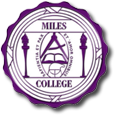 Miles College, the historically black educational institution located just outside the city limits of Birmingham, Alabama, has announced plans to offer graduate-level courses and become a university. The college plans to offer master’s degree programs in education and social work. Miles College, the historically black educational institution located just outside the city limits of Birmingham, Alabama, has announced plans to offer graduate-level courses and become a university. The college plans to offer master’s degree programs in education and social work.
Miles College was founded in 1898 by members of the Christian Methodist Episcopal Church. There are about 1,800 students on campus, almost all of whom are black.
Boston Nightclub Settles Racial Discrimination Complaint Involving an Event After Last November’s Harvard-Yale Football Game
 Last November three black graduates of Harvard University hosted a party at the Cure Lounge in Boston after the annual Harvard-Yale football game. About 400 alumni and graduate students bought tickets for the event. But some guests were turned away at the door when employees of the club stated that a long line of black people on the street would attract “local gangbangers.” Last November three black graduates of Harvard University hosted a party at the Cure Lounge in Boston after the annual Harvard-Yale football game. About 400 alumni and graduate students bought tickets for the event. But some guests were turned away at the door when employees of the club stated that a long line of black people on the street would attract “local gangbangers.”
The Massachusetts attorney general filed a lawsuit against the owner of the club. A settlement was reached in which the club agreed to send its staff to diversity training and to post an apology on its website for 30 days. In addition, the club’s owners agreed to a $30,000 fine that the state will distribute to groups that support African-American opportunities in higher education.
Recent Books That May Be of Interest to African-American Scholars
 The JBHE Weekly Bulletin regularly publishes a list of new books that may be of interest to our readers. Here are the latest selections. The JBHE Weekly Bulletin regularly publishes a list of new books that may be of interest to our readers. Here are the latest selections.
• Black Gotham: A Family History of African Americans in Nineteenth-Century New York City by Carla Peterson (Yale University Press)
• Campy: The Two Lives of Roy Campanella by Neil Lanctot (Simon & Schuster)
• Dirty South: OutKast, Lil Wayne, Soulja Boy, and the Southern Rappers Who Reinvented Hip Hop by Ben Westoff (Chicago Review)
• In Search of Asylum: The Later Writings of Eric Walrond edited by Louis J. Parascandola and Carl A. Wade (University Press of Florida)
• Letters From Black America: Intimate Portraits of the African American Experience edited by Pamela Newkirk (Random House)
• More Beautiful and More Terrible: The Embrace and Transcendence of Racial Inequality in the United States by Imani Perry (New York University Press)
• Oprah: The Gospel of an Icon by Kathryn Lofton (University of California Press)
• Public Engagement for Public Education: Joining Forces to Revitalize Democracy and Equalize Schools edited by Marion Orr and John Rogers (Stanford University Press)
• Race and Antiracism in Black British and British Asian Literature by Dave Gunning (Liverpool University Press)
• Radicalism at the Crossroads: African American Women Activists in the Cold War by Dayo F. Gore (New York University Press)
• The Black Professoriat: Negotiating a Habitable Space in the Academy edited by Sandra Jackson and Richard Greggory Johnson III (Peter Lang Publishing)
• The Imperfect Revolution: Anthony Burns and the Landscape of Race in Antebellum America by Gordon S. Barker (Kent State University Press)
• The Papers of Clarence Mitchell Jr., Volume IV: Director of the NAACP Washington Bureau, 1951-1954 edited by Denton L. Watson (Ohio University Press)
• Troubling Vision: Performance, Visuality, and Blackness by Nicole R. Fleetwood (University of Chicago Press)
• White Kids: Language, Race, and Styles of Youth Identity by Mary Bucholtz (Cambridge University Press)
Honors and Awards
 • Weldon H. Latham, senior partner in the Washington law firm Jackson Lewis and adjunct professor of law at Georgetown University, received the Distinguished Postgraduate Achievement Award from Howard University. • Weldon H. Latham, senior partner in the Washington law firm Jackson Lewis and adjunct professor of law at Georgetown University, received the Distinguished Postgraduate Achievement Award from Howard University.
Latham holds a bachelor’s degree in business administration from Howard University and a law degree from Georgetown University.
 • Johnnetta B. Cole, the anthropologist who served as president of both Spelman College and Bennett College for Women, and is now director of the Smithsonian Institution’s National Museum of African Art, received the George Washington Carver Medal from Simpson College in Indianola, Iowa. • Johnnetta B. Cole, the anthropologist who served as president of both Spelman College and Bennett College for Women, and is now director of the Smithsonian Institution’s National Museum of African Art, received the George Washington Carver Medal from Simpson College in Indianola, Iowa.
 • Vernon C. Polite, the late dean of the College of Education at Eastern Michigan University in Ypsilanti, was honored with the Lifetime Achievement Award from the American Association of Colleges for Teacher Education. Polite died in March 2010 of complications from pancreatic cancer. He was 61 years old. • Vernon C. Polite, the late dean of the College of Education at Eastern Michigan University in Ypsilanti, was honored with the Lifetime Achievement Award from the American Association of Colleges for Teacher Education. Polite died in March 2010 of complications from pancreatic cancer. He was 61 years old.
Dr. Polite was a native of Detroit. He was a graduate of Boston University and held a master’s degree from what is now the University of Massachusetts at Boston. He earned a doctorate in educational leadership and sociology from Michigan State University.
 • Jill J. Harp, associate professor of biochemistry at Winston-Salem State University, received the Excellence in Teaching Award from the University of North Carolina Board of Governors. • Jill J. Harp, associate professor of biochemistry at Winston-Salem State University, received the Excellence in Teaching Award from the University of North Carolina Board of Governors.
Dr. Hill is a graduate of York College of the City University of New York. She earned a Ph.D. in chemistry at the University of Maryland.
 • Eddie Ellis, director of bands at South Carolina State University, received the Palmetto Patriot Award from the lieutenant governor of South Carolina for his commitment to public service. • Eddie Ellis, director of bands at South Carolina State University, received the Palmetto Patriot Award from the lieutenant governor of South Carolina for his commitment to public service.
Ellis is a graduate of Morris Brown College and holds a master’s degree in music education from Georgia State University.
 • John T. Grayson, professor of religion at Mount Holyoke College in South Hadley, Massachusetts, received the college’s Faculty Award for Teaching. • John T. Grayson, professor of religion at Mount Holyoke College in South Hadley, Massachusetts, received the college’s Faculty Award for Teaching.
Dr. Grayson is a graduate of Atlantic Union College in South Lancaster, Massachusetts. He holds a master’s degree from Andrews University and a master’s degree and Ph.D. from Columbia University.
 • Leyte Winfield, associate professor of chemistry at Spelman College in Atlanta, received the 2011 Minority-Serving Institution Faculty Scholar in Cancer Research Award from the American Association of Cancer Research. • Leyte Winfield, associate professor of chemistry at Spelman College in Atlanta, received the 2011 Minority-Serving Institution Faculty Scholar in Cancer Research Award from the American Association of Cancer Research.
Dr. Winfield is a graduate of Dillard University in New Orleans and holds a Ph.D. from the University of New Orleans.
• Mark Best, director of workforce readiness programs at Craven Community College in New Bern, North Carolina, was named staff person of the year by the North Carolina Community College System. Best is a 1978 graduate of Fayetteville State University.
|
 .
.